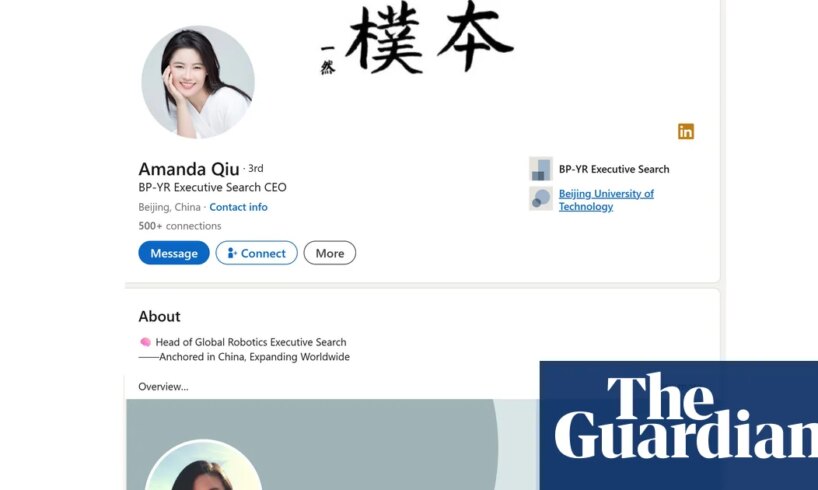
MPs and peers have been told they face “a covert and calculated” attempt to recruit parliamentarians through two LinkedIn profiles linked to the Chinese intelligence service.
After MI5 issued an espionage alert on Tuesday, saying that two people were operating on LinkedIn to obtain “non-public and insider insights”, the security minister, Dan Jarvis, told MPs the effort was focused on those “with access to sensitive information about parliament and the UK government”.
With the Chinese embassy in London dismissing the accusations as “pure fabrication”, the diplomatic dispute appeared to be a new flashpoint in the increasingly tense relationship between China and the UK over alleged espionage.
MI5 said the profiles were under the names Amanda Qiu, from BR-YR Executive Search, and Shirly Shen, who is linked to Internship Union, and told MPs and peers they were using LinkedIn to “conduct outreach at scale”.
The spy agency sent its warning to the speaker of the Commons, Lindsay Hoyle, and his Lords equivalent, John McFall, on Tuesday morning, both of whom relayed its contents to the members of their houses with a cover message.
In his email to peers, McFall said the individuals, linked to China’s ministry of state security spy agency (MSS), were aiming “to collect information and lay the groundwork for long-term relationships, using professional networking sites, recruitment agents and consultants acting on their behalf”.
Qiu’s profile on LinkedIn, written in English, describes her as having been the chief executive of BR-YR Executive Search for more than six years and says she is based in Beijing. Her listed interests include the UK’s Department for Transport and the Tony Blair Institute.
Shen’s profile, also largely in English, describes her as a co-founder of Internship Union, based in Hangzhou, eastern China. She says it “has helped hundreds of students come to China” and she describes herself as “a positive Asia girl” who would “welcome friends all over world join us to get a magic Chinese experience”.
Both appear to be young women but it is not known if the photographs are genuine. Chinese spies often use false personas, MI5 said in its alert, with a frequent archetype that of a young woman with an anglicised first name.
The Labour MP Josh Simons was connected with Shen on LinkedIn, although he said they did not exchange any messages. He removed Shen as a contact on Tuesday.
The security minister, Dan Jarvis, confirmed the alert had been sent out in a lunchtime Commons statement. “This activity involves a covert and calculated attempt by a foreign power to interfere with our sovereign affairs in favour of its own interests, and this government will not tolerate it,” he told MPs.
He said MI5 had warned that the espionage campaign was “being carried out by a group of Chinese intelligence officers, often masked through the use of cover companies or external headhunters”.
China’s embassy in the UK accused Britain of engaging in “pure fabrication and malicious slander”. A spokesperson said: “We urge the UK side to immediately stop this self-staged charade of false accusations and self-aggrandisement, and stop going further down the wrong path of undermining China-UK relations.”
It is understood that the rare decision by MI5 to issue the espionage alert was taken because of the intensity of the ongoing threat rather than because of any particular episode – though relations with China remain sensitive despite efforts by Labour to foster a positive trading relationship with Beijing.
Earlier in the autumn, a political row about the scale of the threat posed by China followed a surprise decision by the Crown Prosecution Service to drop espionage charges against Christopher Cash, a parliamentary researcher, and Christopher Berry, a friend based in China, a month before their trial.
A similar parliamentary alert was issued nearly four years ago, warning MPs and peers about Christine Lee, a high-profile Anglo-Chinese lawyer, who had donated more than £500,000 to fund the office costs of the Labour MP Barry Gardiner and who had received a special award from the then prime minister, Theresa May.
MI5 has previously warned about Chinese spies seeking to obtain information by using LinkedIn to recruit Britons working in sensitive areas. Posing as recruitment consultants, the agents, normally women, have sought to lure at least 20,000 Britons with potential job offers.
The MI5 alert, a single-page slide, explains the recruitment methodology used by Chinese spies on LinkedIn. Targets “will typically be approached to work as freelance consultants authoring geopolitical reports”, though sometimes people are offered a job with a company, though the person hiring is in fact a spy.
Red flags, MI5 said, were requests for details that were “‘non-public’; ‘timely’; ‘off the record’; ‘sensitive’; and ‘insider information’” – while preferred forms of payment were cash, for those willing to go China, or crypto currency.
Last year, Qiu’s BP-YR Executive Search posted a job advert on LinkedIn for a “part-time adviser” who would be paid up to €20,000 (£17,600) a year to write five to 10 reports on “the ongoing policy which may affect foreign business in your country (UK, France, Germany, Spain, Italy etc)”.
The advert said the reports would be for Power Glory Battery Tech, a Chinese lithium battery company. It asked for a person who was “an expert or an ‘insider’ regarding to either politics or the economy” and who had previous experience in government, colleges or thinktanks, and offered them one to two free trips to Asia each year.
Jarvis also told the Commons that he would ask MI5 to provide security briefings for political parties, issue guidance for election candidates and tighten rules on political donations as part of a plan to counter political interference. Countries such as China often focused on people “one step removed” from their ultimate target, MI5 warned.
The British government had also completed a plan to remove surveillance cameras supplied by Chinese companies “from all sensitive sites we maintain in the UK”, Jarvis said. Though he did not name the companies involved, the principal supplier is Hikvision, which makes CCTV cameras.
Qiu and Shen have been approached for comment.
Quick GuideContact us about this storyShow
The best public interest journalism relies on first-hand accounts from people in the know.
If you have something to share on this subject, you can contact us confidentially using the following methods.
Secure Messaging in the Guardian app
The Guardian app has a tool to send tips about stories. Messages are end to end encrypted and concealed within the routine activity that every Guardian mobile app performs. This prevents an observer from knowing that you are communicating with us at all, let alone what is being said.
If you don’t already have the Guardian app, download it (iOS/Android) and go to the menu. Select ‘Secure Messaging’.
SecureDrop, instant messengers, email, telephone and post
If you can safely use the Tor network without being observed or monitored, you can send messages and documents to the Guardian via our SecureDrop platform.
Finally, our guide at theguardian.com/tips lists several ways to contact us securely, and discusses the pros and cons of each.
Illustration: Guardian Design / Rich Cousins
Thank you for your feedback.





